AP Poll: Americans overwhelmingly view Donald Trump negatively
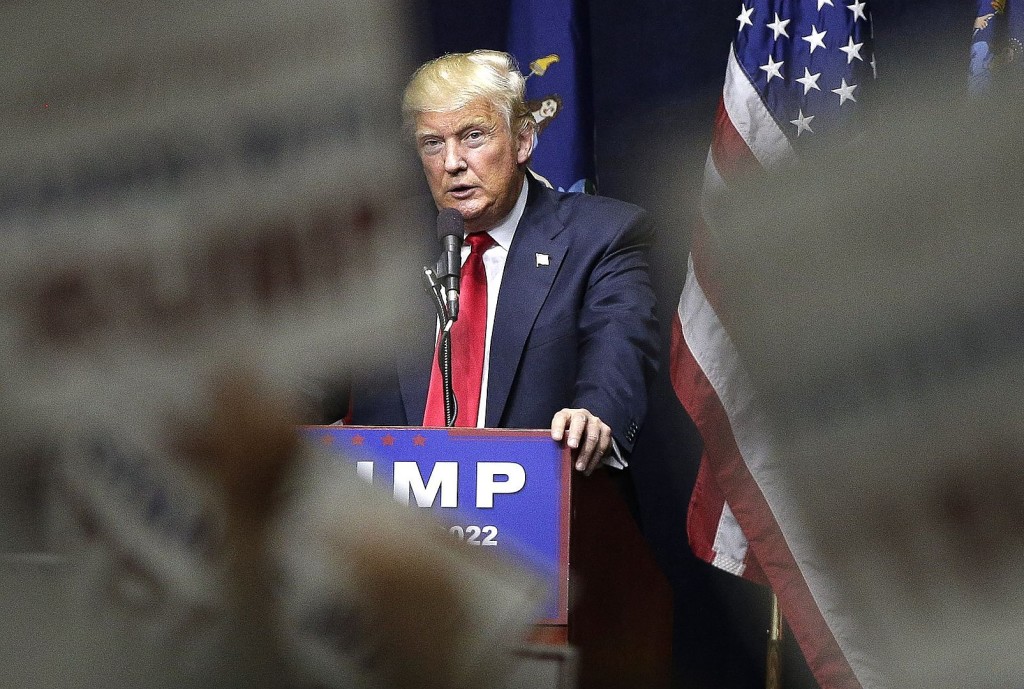
For Americans of nearly every race, gender, political persuasion and location, disdain for Donald Trump runs deep, saddling the Republican front-runner with unprecedented unpopularity as he tries to overcome recent campaign setbacks. Seven in 10 people, including close to half of Republican voters, have an unfavorable view of Trump, according to a new Associated Press-GfK poll. It’s an opinion shared by majorities of men and women; young and old; conservatives, moderates and liberals; and whites, Hispanics and blacks — a devastatingly broad indictment of the billionaire businessman. Even in the South, a region where Trump has won GOP primaries decisively, close to 70 percent view him unfavorably. And among whites without a college education, one of Trump’s most loyal voting blocs, 55 percent have a negative opinion. Trump still leads the Republican field in delegates and has built a loyal following with a steady share of the Republican primary electorate. But the breadth of his unpopularity raises significant questions about how he could stitch together enough support in the general election to win the White House. It also underscores the trouble he may still face in the Republican race, which appears headed to a contested convention where party insiders would have their say about who will represent the GOP in the fall campaign. “He’s at risk of having the nomination denied to him because grass-roots party activists fear he’s so widely disliked that he can’t possibly win,” said Ari Fleischer, a former adviser to President George W. Bush. Beyond their generally negative perception of Trump, large majorities also said they would not describe him as civil, compassionate or likable. On nearly all of these measures, Trump fared worse than his remaining Democratic or Republican rivals. Not that voters have all that much love for those rivals. But their negative perceptions don’t match the depth of the distaste for Trump. Texas Sen. Ted Cruz, who is seeking to catch Trump in the Republican delegate count, is viewed unfavorably by 59 percent, while 55 percent have negative views of Democratic front-runner Hillary Clinton. Another problem for Trump is that his public perception seems to be getting worse. The number of Americans who view him unfavorably has risen more than 10 percentage points since mid-February, a two-month stretch that has included some of his biggest primary victories but also an array of stumbles that suggested difficulties with his campaign organization and a lack of policy depth. A survey conducted by Gallup in January found Trump’s unfavorable rating, then at 60 percent in their polling, was already at a record high level for any major party nominee in their organization’s polling since the 1990’s. Candi Edie, a registered Republican from Arroyo Grande, California, is among those whose views on Trump have grown more negative. “At first, I thought he was great. He was bringing out a lot of issues that weren’t ever said, they were taboo,” Edie said. Now the 64-year-old feels Trump’s early comments masked the fact that he’s “such a bigot.” “I don’t know if he’s lost it or what,” she said. “He’s not acting presidential.”Trump’s unpopularity could provide an opening for Cruz, though he is loathed by many of his Senate colleagues and other party leaders. After a big win Tuesday in Wisconsin, Cruz is angling to overtake Trump at the July GOP convention. Clinton’s campaign believes Trump’s sky-high unfavorable ratings could offset some questions voters have about her own character, and perhaps even give her a chance to peel off some Republicans who can’t stomach a vote for the real estate mogul. Andrew Glaves, a “hard core” Republican from Bothell, Washington, said he might have to side with Clinton if Trump becomes the nominee, even though she’s out of step with his views on gun rights, his top election issue. “I’d be willing to take that as opposed to doing so much harm to the country’s reputation,” said Glaves, 29. More than 60 percent of all registered voters and 31 percent of Republicans said they definitely would not vote for Trump in the general election. One group that is still with him includes those who describe themselves as both Republicans and supporters of the tea party movement. Sixty-eight percent of them have a favorable view. Pennsylvania Republican Robert Paradis plans to vote for Trump in his state’s primary this month. The 76-year-old said that while Trump’s uneven temperament makes him cringe “all the time,” he’s hopeful the front-runner’s bluntness can shake up Washington. “He’s not a politician; he says it the way he feels it,” Paradis said. ___ The AP-GfK Poll of 1,076 adults was conducted online March 31-April 4, using a sample drawn from GfK’s probability-based KnowledgePanel, which is designed to be representative of the U.S. population. The margin of sampling error for all respondents is plus or minus 3.3 percentage points. Respondents were first selected randomly using telephone or mail survey methods and later interviewed online. People selected for KnowledgePanel who didn’t otherwise have access to the Internet were provided access at no cost to them. Republished with permission of the Associated Press.
Ted Cruz’s winning ways have yet to win over fellow GOP senators
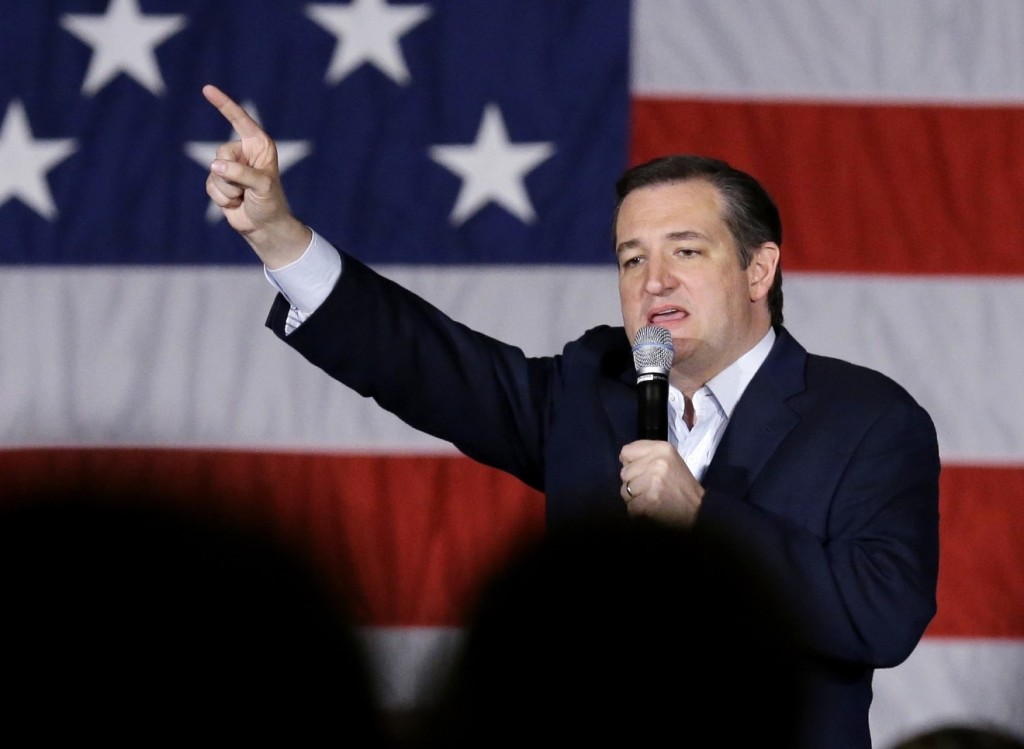
Sen. Ted Cruz is increasingly winning over voters to his presidential bid. He’s still not winning over fellow Republican senators. The Texas Republican is notorious for alienating his colleagues with tactics including pushing a fruitless government shutdown in 2013 and accusing the Senate majority leader of lying. They’re now paying it back by refusing to get on board with his presidential bid even as he emerges as the likeliest alternative to businessman Donald Trump following a commanding win Tuesday night in Wisconsin. “I just haven’t heard any talk about it,” responded Sen. Orrin Hatch, R-Utah, a senior Republican, when asked whether Republican colleagues would be gravitating toward Cruz. “I will tell you that wasn’t the chatter,” said Sen. Dean Heller, R-Nev., after emerging from a closed-door GOP lunch. “I don’t see any rush to judgment,” remarked Sen. Pat Roberts of Kansas, a four-term lawmaker. Of Cruz’s frosty relations with his colleagues, Roberts said: “I think that’s obvious. That’s just the way it is. But in the end result I think all of us would like to support the nominee and do the best we can.” Sen. Lindsey Graham of South Carolina, who has made a half-hearted endorsement of Cruz, predicted Wednesday that more establishment support would be swinging behind the Texas freshman senator. Graham, a short-lived candidate himself, is advancing the argument that while the erratic Trump would destroy the GOP for generations to come by turning off women and minorities, Cruz is at least a reliable Republican with a steady foreign policy outlook who shares his colleagues’ views on most issues. “I think some of Ted’s tactics have hurt the party but the overall vision is far more common,” Graham said. Although Graham also contends Cruz could be electable, his argument for backing Cruz is being dubbed by some pundits the “Lose With Cruz” movement. And it’s falling on deaf ears with some colleagues. “Not yet,” said GOP Sen. Jeff Flake of Arizona, when asked if he’d be backing Cruz. “I’m no fan of Donald Trump, I think I’ve said that before,” Flake added. “But this isn’t over. John Kasich is still in the race, no candidate is likely to have the necessary votes and so I wouldn’t discount Kasich or something else happening.” Sen. Mark Kirk of Illinois, one of the more vulnerable incumbents in November, said of Cruz’s chances of wooing fellow Republican senators: “I would say a slow process with a lot of romance and a lot of discussion would be necessary.” Kirk then demurred on whether he himself would get there. “I’ve been strictly staying out of the presidential because it’s just a minefield for me,” he said. Sen. Cory Gardner, a Colorado Republican who previously supported GOP presidential candidate Sen. Marco Rubio of Florida, told reporters that “Donald Trump is still not going to be the nominee” and “I don’t see a path for Kasich,” the Ohio governor who lagged Cruz and Trump in Wisconsin. Talk of House Speaker Paul Ryan, R-Wis., or another outsider scooping up the nomination in a convention fight? “I think that’s nonsense,” Gardner said. Nonetheless, he was reluctant to commit to Cruz. “Any nominee is going to have to earn my support,” Gardner added. “Just like they’ll have to earn the support of the delegates this weekend in Colorado,” when the state convention officially chooses its delegates. Endangered GOP Sen. Kelly Ayotte of New Hampshire, who has tangled publicly with Cruz over his failed efforts to “defund” both the health care law and Planned Parenthood, sidestepped when asked if she’s coming around to the idea that Cruz will be the nominee. “I’m coming around to more like, ‘It looks like it will be a very interesting convention,’ ” Ayotte said. Cruz himself has lumped in Senate Majority Leader Mitch McConnell, a Kentucky Republican, with other GOP leaders as part of the “Washington cartel.” But campaigning Wednesday in New York City, Cruz claimed that his Wisconsin win would be a “turning point” that showed Republicans were coming together to stand united. The election, he said, “is about unity.”
Ted Cruz, Bernie Sanders emerge victorious in Wisconsin primaries
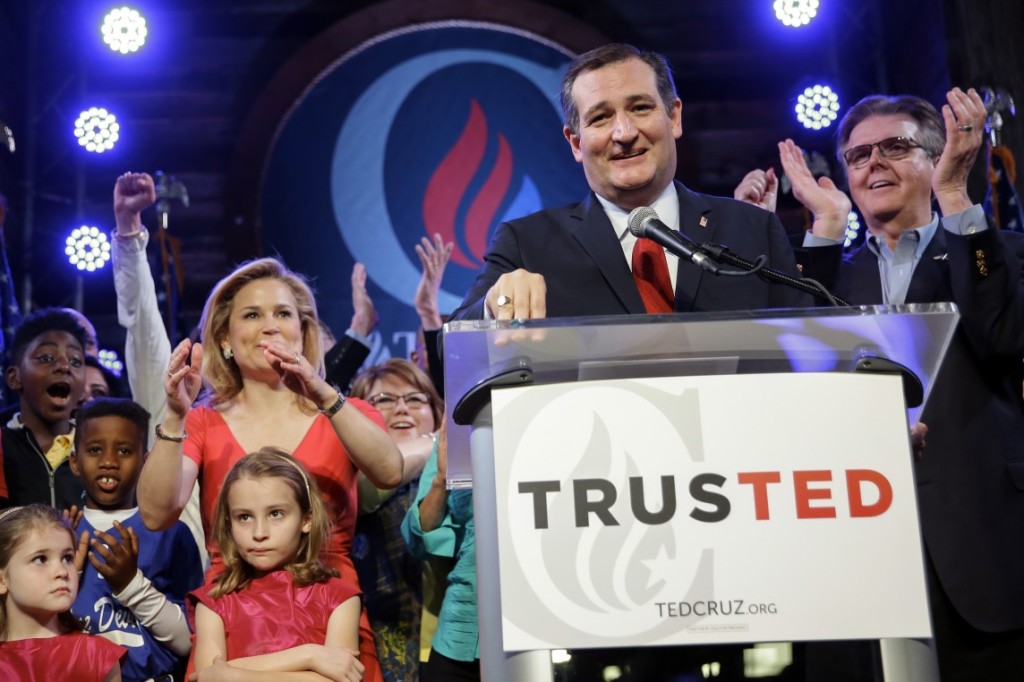
Republican Ted Cruz stormed to a commanding victory in Wisconsin Tuesday, denting front-runner Donald Trump‘s chances of capturing the GOP nomination before the party’s convention. Democrat Bernie Sanders triumphed over Hillary Clinton but still faces a mathematically difficult path to the White House. Trump’s defeat capped one of the worst periods of his campaign, a brutal stretch that highlighted his weaknesses with women and raised questions about his policy depth. While the billionaire businessman still leads the Republican field, Cruz and an array of anti-Trump forces hope Wisconsin signals the start of his decline. “Tonight is a turning point,” Cruz told cheering supporters at a victory rally. “It is a call from the hardworking people of Wisconsin to America. We have a choice. A real choice.” Cruz, a Texas senator with a complicated relationship with Republican leaders, also cast his victory as a moment for unity in a party that has been roiled by a contentious primary campaign. But Trump was unbowed. His campaign put out a biting statement: “Ted Cruz is worse than a puppet— he is a Trojan horse, being used by the party bosses attempting to steal the nomination from Mr. Trump.” Sanders’s sweeping win in virtually every county in Wisconsin, except Milwaukee, gives him greater incentive to keep competing against Clinton. But he still trails her in the pledged delegate count and has so far been unable to persuade superdelegates— the party officials who can back any candidate — to drop their allegiance to the former secretary of state and back his campaign. At a raucous rally in Wyoming, Sanders cast his victory as a sign of mounting momentum for his campaign. “With our victory tonight is Wisconsin, we have now won 7 out of 8 of the last caucuses and primaries,” he declared. The results in Wisconsin make it likely both parties’ primaries will continue deep into the spring, draping front-runners Trump and Clinton in uncertainty and preventing both from fully setting their sights on the general election. With an overwhelming white electorate and liberal pockets of voters, Wisconsin was favorable territory for Sanders. In a sign of Clinton’s low expectations in the Midwestern state, she spent Tuesday night at a fundraiser with top donors in New York City. Clinton congratulated Sanders on Twitter and thanked her supporters in Wisconsin. “To all the voters and volunteers who poured your hearts into this campaign: Forward!” she wrote. Sanders’ win will net him a handful of additional delegates, but he’ll still lag Clinton significantly. With 86 delegates at stake in Wisconsin, Sanders will pick up at least 44 and Clinton will gain at least 28. That means Sanders must still win 67 percent of the remaining delegates and uncommitted superdelegates in order to win the Democratic presidential nomination. While Trump has been the dominant force in the Republican race, he battled a series of campaign controversies in the lead-up to Wisconsin, including his campaign manager’s legal problems following an altercation with a female reporter and his own awkward stumbles in clarifying his views on abortion. Wisconsin’s Republican establishment, including Gov. Scott Walker, has also campaigned aggressively against the businessman. Exit polls in the state underscored the concerns about Trump that are surging through some corners of the Republican Party. A majority of Republican voters said they’re either concerned or scared of a potential Trump presidency. More than a third said they were scared about what Trump would do as president, and about 2 in 10 said they were concerned, according to surveys conducted by Edison Research for The Associated Press and television networks. The Texas senator was poised to collect most of Wisconsin’s 42 Republican delegates. Trump still has a narrow path to claim the nomination by the end of the primaries on June 7. But by losing Wisconsin, the real estate mogul has little room for error in upcoming contests. Complicating the primary landscape for both Cruz and Trump is the continuing candidacy of John Kasich. The Ohio governor’s only victory has come in his home state, but he’s still picking up delegates that could otherwise help Trump inch closer to the nomination or help Cruz catch up. To win a prolonged convention fight, a candidate would need support from the individuals selected as delegates. The process of selecting those delegates is tedious, and will test the mettle of Trump’s slim campaign operation. Cruz prevailed in an early organizational test in North Dakota, scooping up endorsements from delegates who were selected at the party’s state convention over the weekend. While all 28 go to the national convention as free agents, 10 said in interviews they were committed to Cruz. None has so far endorsed Trump. Despite the concern among some Wisconsin Republicans about Trump becoming president, nearly 6 in 10 GOP voters there said the party should nominate the candidate with the most support in the primaries, which so far would be Trump. Even among voters who favored Cruz, 4 in 10 said the candidate with the most support going into the convention should be the party’s nominee. Republished with permission of the Associated Press.
Ted Cruz, Bernie Sanders angle for wins in Wisconsin primaries

Republican Ted Cruz and Democrat Bernie Sanders are angling for victories in Tuesday’s Wisconsin presidential primaries that could give their campaigns a needed boost, but still leave them with mathematically challenging paths to their parties’ nominations. While Sanders remains a force in the Democratic primary, a win over Hillary Clinton in Wisconsin would do little to significantly cut into her lead in delegates that will decide the party’s nomination. The stakes are higher for Cruz, who trails Donald Trump in the GOP race and sees Wisconsin as a crucial state in his effort to push the party toward a convention fight. “We are seeing victory after victory after victory in the grassroots,” Cruz said during a campaign stop Monday. “What we are seeing in Wisconsin is the unity of the Republican Party manifesting.” With the White House and control of Congress at stake in November, leaders of both parties are eager to turn their attention toward the general election. Clinton would enter the fall campaign saddled with persistent questions about her honesty and trustworthiness, but also with a significant demographic advantage. It’s an edge Democrats believe would be magnified in a race against Trump, who has made controversial comments about immigrants and women. For Trump, the long lead-up to Wisconsin’s contest has included one of the worst stretches of his candidacy. He was embroiled in a spat involving Cruz’s wife, which he now says he regrets, was sidetracked by his campaign manager’s legal problems after an altercation with a female reporter, and stumbled awkwardly in comments about abortion. While Trump is the only Republican with a realistic path to clinching the nomination ahead of the Republican convention, a big loss in Wisconsin would greatly reduce his chances of reaching the 1,237 delegates needed to do so before the GOP gathers in Cleveland. Cruz headed into Tuesday’s contest with the backing of much of the state’s Republican leaders, including Gov. Scott Walker, but Trump made a spirited final push in the state and predicted a “really, really big victory.” “If we do well here, it’s over,” he said. “If we don’t win here, it’s not over.” Complicating the primary landscape for both Cruz and Trump is the continuing candidacy of John Kasich. The Ohio governor’s only victory has come in his home state, but he’s still picking up delegates that would otherwise help Trump inch closer to the nomination or help Cruz catch up. Trump has grown increasingly frustrated with the governor and has joined Cruz in calling for Kasich to end his campaign. Kasich cast Trump’s focus on him as a sign that he’s best positioned to win over the businessman’s supporters. “They’re not really his people,” Kasich said. “They’re Americans who are worried about, they’re really most worried about their kids, are their kids going to have a good life?” If Cruz wins all of Wisconsin’s 42 delegates, Trump would need to win 57 percent of those remaining to clinch the GOP nomination before the convention. So far, Trump has won 48 percent of the delegates awarded. To win a prolonged convention fight, a candidate would need support from the individuals selected as delegates. The process of selecting those delegates is tedious, and will test the mettle of Trump’s slim campaign operation. Cruz prevailed in an early organizational test in North Dakota, scooping up endorsements from delegates who were selected at the party’s state convention over the weekend. While all 28 of the state’s delegates go to the national convention as free agents, 10 said in interviews that they were committed to Cruz. None has so far endorsed Trump. Paul Lorentz, was in line at 6:30 a.m. in Sun Prairie, Wisconsin, Tuesday to cast a vote for Kasich saying he typically votes Democratic in the general election and Republican in Wisconsin’s open primary, in order to sway that side to a better candidate. “My hope is always to have two acceptable candidates running for president,” Lorentz said. Among Democrats, Clinton has 1,243 delegates to Sanders’ 980 based on primaries and caucuses. When including superdelegates, or party officials who can back any candidate, Clinton holds an even wider lead — 1,712 to Sanders’ 1,011. It takes 2,383 delegates to win the Democratic nomination. Sanders would need to win 67 percent of the remaining delegates and uncommitted superdelegates to catch up to Clinton. So far, he’s only winning 37 percent. Even if Sanders wins in Wisconsin, he’s unlikely to gain much ground. Because Democrats award delegates proportionally, a narrow victory by either candidate on Tuesday would mean that both Sanders and Clinton would get a similar number of delegates. Carrie-Ann Todd, a 39-year-old mother saddled with student debt, said she voted for Sanders on Tuesday given his efforts to address the cost of college. “I’m paying more on my student loans than I am on my cars,” Todd says. “I don’t know if he’ll get any support if he gets into the White House, but it’s worth a shot.” Republished with permission of the Associated Press.
Donald Trump in Wisconsin: ‘I automatically win’ if John Kasich quits
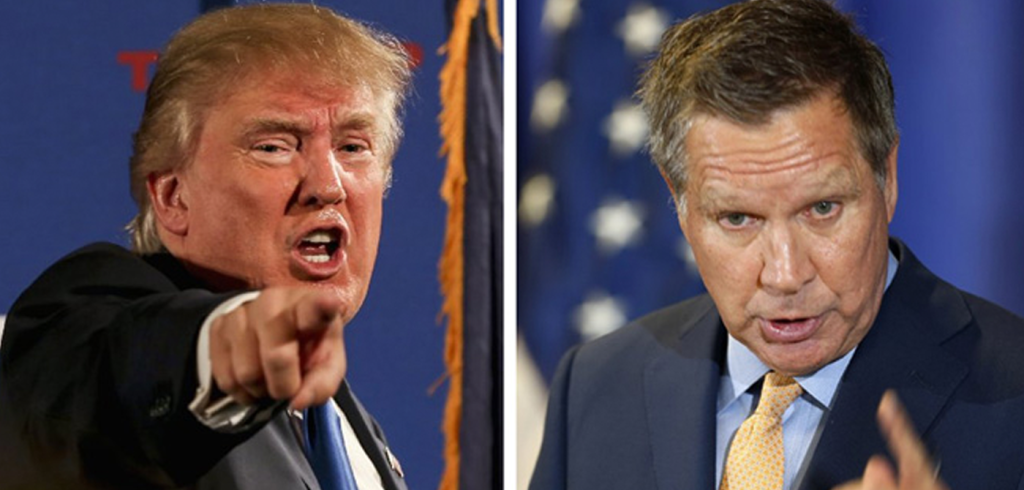
Republican presidential front-runner Donald Trump is pushing rival John Kasich to get out of the White House race, arguing that the Ohio governor shouldn’t be allowed to collect future delegates because the nomination is already beyond his grasp. Trying hard to right himself after a difficult week, Trump said it was unfair for Kasich, the winner of only his home state’s primary, to continue campaigning. He suggested that Kasich, who has pledged to make it to the summer convention, follow the lead of former candidates Marco Rubio and Jeb Bush – and quit. “If I didn’t have Kasich, I automatically win,” Trump said Sunday evening in West Allis, Wisconsin. Trump said Kasich could ask to be considered at the GOP convention in Cleveland in July even without competing in the remaining nominating contests. He said earlier Sunday that he had shared his concerns with Republican National Committee officials at a meeting in Washington this past week. Kasich’s campaign countered that neither Trump nor Texas Sen. Ted Cruz would have enough delegates to win the nomination outright in Cleveland. “Since he thinks it’s such a good idea, we look forward to Trump dropping out before the convention,” said Kasich spokesman Chris Schrimpf. Meanwhile, former GOP candidate and Trump supporter Ben Carson warned Monday that “it would be a disaster” if the Republican party tries to put forward any alternative candidates to Trump or Cruz at the July convention. Speaking to ABC’s “Good Morning America,” Carson said that if that scenario plays out, “we have major problems brewing.” Across the political aisle, Democrat Hillary Clinton told NBC’s “Meet the Press” that the FBI had yet to request an interview regarding the private email server she used as secretary of state. Clinton and her Democratic opponent, Vermont Sen. Bernie Sanders, announced they’d agreed to debate in New York before the important April 19 primary, though their campaigns continued debating over when to schedule the face-off. Sanders, meanwhile, fired up a crowd in Wausau, Wisconsin, hoping to continue a string of recent campaign victories even as Clinton maintains a sizable delegate lead. Trump’s call for Kasich to bow out came as Republican concerns grew about the prospect of convention chaos if Trump fails to lock up his party’s nomination – or even if he does. Behind Cruz in the polls in Wisconsin, Trump faces the prospect that a loss on Tuesday there will raise further doubts that he can net the needed delegates, making it far easier for his party to oust him in a floor fight at the convention in Cleveland in July. Cruz, Trump’s closest challenger, has only a small chance to overtake the real estate mogul in the delegate hunt before the convention. Cruz spent Sunday rallying supporters, including conservative Wisconsin talk radio hosts who oppose Trump’s candidacy. Kasich acknowledges that he cannot catch up in the delegate race, leaving a contested convention his only path to victory. He has faced calls in the past to step aside, but those nudges became less frequent following his decisive victory last month in his home state. Still, Kasich suggested that a contested convention would not involve the chaos that party leaders fear. “Kids will spend less time focusing on Bieber and Kardashian and more time focusing on how we elect presidents,” Kasich told ABC. “It will be so cool.” Republicans fear a bruising internal fight would damage the party in November’s general election. Trump also isn’t ruling out the possibility of running as an independent if he isn’t the nominee, making it that much harder for the GOP to retake the White House. Such talk has “consequences,” said GOP Chairman Reince Priebus, though he tried to quell the prospect of a convention fight. He told ABC that the process will be clear and open, with cameras there “at every step of the way.” Frustration with the GOP field has stoked calls in some Republican corners for the party to use a contested convention to pick someone not even on the ballot. Priebus acknowledged that was a remote possibility, but said he believed his party’s nominee would be “someone who’s running.” Trump has been on the defensive as he struggled to explain away a week of controversies over abortion, nuclear weapons and his campaign manager. “Was this my best week? I guess not,” Trump told “Fox News Sunday.” ___ Republished with permission of the Associated Press.
Donald Trump works to right campaign before Wisconsin votes

Donald Trump worked to right his campaign on Sunday after a shaky week, brushing off verbal missteps about abortion, nuclear weapons and GOP rival Ted Cruz as he cast forward to Tuesday’s Republican presidential primary in Wisconsin. Trump, acknowledging the possibility of a loss to Cruz in Wisconsin, said it would be better to win the state but was confident he would capture the nomination regardless. He acknowledged that the past few days had marked a difficult patch for his campaign. “I think I get there anyway” — meaning the nomination — Trump told “Fox News Sunday. The Republican race is overshadowed by a persistent effort by Trump’s rivals in the campaign and the party to force the nomination fight into the July convention. Amid talk of the Republican establishment trying to block the front-runner, GOP Chairman Reince Priebus said the nomination process will be clear, open and transparent. Cameras will be there “at every step of the way” at the convention, he said on ABC’s “This Week.” If the race isn’t settled after all the primary contests, then “we’re going to have a multi-ballot convention,” with more and more delegates free to pick a candidate of their choice in each round. But Priebus was clear: “Nothing can get stolen from anyone.” On the Democratic side, the race between Hillary Clinton and Bernie Sanders has grown increasingly bitter, too, though it has not matched the GOP contest for raw hostility. Their attention will quickly turn to an even more consequential contest, in New York on April 19, where Clinton hopes to avoid an upset in the state she served as senator. Clinton told NBC’s “Meet the Press” that she was confident the two campaigns could settle on a debate date before that primary. In recent days, Clinton has taken issue with Sanders’ suggestions that her campaign is being aided by fossil-fuel interests, and in the broadcast interview, she accused Sanders’ aides of doing insufficient research about her record of standing up to oil and gas companies. “We were not lying,” Sanders told CNN’s “State of the Union.” ”We were telling the truth.” Wisconsin has emerged as a proving ground for anti-Trump forces as the front-runner’s campaign hit a rough patch. Cruz has little chance to overtake Trump in the delegate hunt before the convention. Ohio Gov. Kasich has none. Both hope to deny Trump a delegate majority in what’s left of the primary season, forcing the nomination to be settled at a contested convention at which one of them might emerge. Kasich expressed confidence that Republicans would have an “open convention,” but suggested it wouldn’t involve the type of unseemly chaos that party leaders fear will play out on national television, dampening their prospects for winning the presidency and possibly House and Senate races, too. Kasich told ABC that a contested convention will be “so much fun.” “Kids will spend less time focusing on Bieber and Kardashian and more time focusing on how we elect presidents,” Kasich said. “It will be so cool.” Republished with permission of the Associated Press.
Hillary Clinton targets Donald Trump in new ad
Hillary Clinton is going after Republican front-runner Donald Trump in a new advertisement, without ever mentioning his name. The Clinton campaign is launching the ad in New York ahead of its April 19 primary, according to POLITICO Playbook. The 30-second spot, called “New York,” features Clinton speaking over images of New York. “New York, 20 million people strong. No, we don’t all look the same, we don’t all sound the same either. But when we pull together we do the biggest things in the world,” the former Secretary of State is heard saying in the advertisement. “So when some say we can solve America’s problems by building walls, banning people based on their religion and turning against each other; well this is New York, and we know better,” she continues as an image of a Trump sign and violence at a rally flash onto the screen. Trump holds a commanding lead over his Republican opponents in New York. Recent polling averages show Trump has an average lead of 38 percent over John Kasich and Ted Cruz. Polling averages show Clinton leads Bernie Sanders by an average of nearly 35 percent.
Presidential Primary Brief: 224 days until Election Day
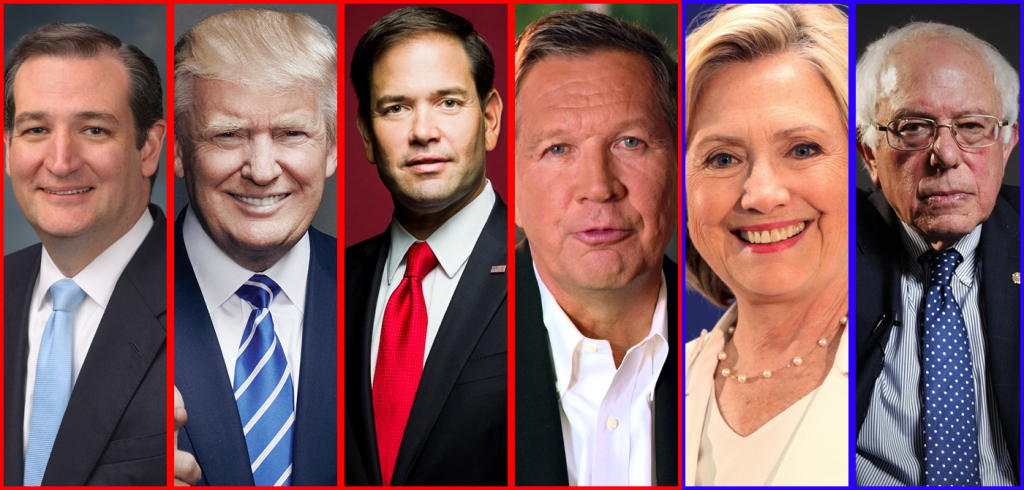
232 days until Election Day Convention Dates: Republican July 18-21 2016, Democratic July 25-28 2016 Weekly Headlines: California Poll: Trump ahead in GOP primary Sanders romps in Washington, Alaska, Hawaii CNN/ORC Poll: Clinton tops Trump on presidential traits Press Clips: Starbucks CEO Says Presidential Election Will Be a Test of Americans’ Morality (Fortune 3/23/16) Starbucks Chief Executive Howard Schultz gave an impassioned plea for civility in the run up to the November presidential election, calling it a critical test of Americans’ morality. Schultz, who is outspoken, progressive, and often controversial on social issues, told an annual meeting of Starbucks shareholders in Seattle on Wednesday that he feels enormous pain at the harsh and coarse tenor of political discourse and growing cynicism among the electorate. “There are moments where I’ve had a hard time recognizing who we are and who we are becoming,” Schultz said. He added: “We are facing a test not only of our character but of our morality as a people.” Concern for environmental issues rises ahead of 2016 election (MSNBC 3/21/16) New polls indicate that concern for environmental issues has risen ahead of the 2016 presidential election. Americans are taking global warming more seriously now than at any period in the last eight years, according to Gallup’s annual environment survey. Sixty-four percent of Americans said that they are either worried a “great deal” or “fair amount” about global warming. At this time in 2015, only 55 percent of Americans said they felt this way. Findings from Gallup also reveal that 63 percent of Americans said the weather in their local area was warmer than usual this winter. When they were asked what they attributed these temperatures to, more Americans ascribed the shift to climate change than normal variation. Gallup’s report noted that “a larger, more regionally and politically diverse group of Americans is reporting warmer temperatures this year.” Sanders worried Clinton won’t debate (Politico 3/27/16) Sen. Bernie Sanders said Sunday that he wants to have a debate with former Secretary of State Hillary Clinton ahead of the April 19 New York presidential primary, but he is worried that Clinton, once the state’s senator, does not. “Yeah, I do have a little bit of concern about that,” Sanders said on NBC’s “Meet the Press,” after easily winning Saturday in Alaska, Hawaii and Washington. “But I certainly would like to see a debate in New York state.” Sanders declined to say what his conditions would be to support Clinton as the Democrats’ presidential nominee, telling host Chuck Todd, “I hope very much, Chuck, that you will be asking her that question.” How YouTube is shaping the 2016 presidential election (Washington Post 3/25/16) In the years since Sarah Palin’s sound bites and the “Obama girl” cemented 2008 as America’s first “YouTube election,” the world’s most popular video site has proven even more spellbinding — and powerful — than political campaigns ever imagined. In January, a political ad — actually, three — ranked among YouTube’s 10 most-watched ads for the first time in history, delivering millions more views to campaigns than to the best commercials corporate America had to offer. And in the early caucus and primary states of Iowa, New Hampshire, South Carolina and Nevada, the streaming giant’s open pool of reserved ad time did something it had never done: It sold out, a sign that candidates yearned so deeply to reach voters’ cell phones that they wanted to snatch up every YouTube second money could buy. Cruz’s missing Obamacare replacement plan (Politico 3/27/16) Everyone knows how Ted Cruz feels about Obamacare. He’s the guy who shut down the government in a bid to kill it — and should he reach the White House, he’d take a blowtorch to the law. But Cruz isn’t very clear about what — if anything — he’d do to replace a law covering 20 million people. And some establishment Republicans suggest that he address this head-on before the pivotal April 5 primary in Wisconsin, where Republican leaders have been more aggressive in fleshing out alternative health plans. What the Brussels attacks mean for the 2016 presidential race (Fortune 3/22/16) At least 34 people have died in terrorist attacks Brussels, Belgium, one in Brussels’ international airport on Tuesday, and the other in one of the city’s subway stations. The attacks have already resulted in a massive outpouring of sympathy from politicians, world leaders, and others throughout the world. Such a devastating attack is bound to have a profound effect on the political conversation both in Europe and beyond, particularly on matters of security and counterterrorism. And it will surely affect the tone and tenor of the race for the presidency in the United States. Lindsey Graham On The 2016 Election: ‘My Party Is Completely Screwed Up’ (Huffington Post 3/24/16) For Sen. Lindsey Graham (R-S.C.), the only thing worse than the prospect of Ted Cruz as president is the prospect of Donald Trump as president. Graham begrudgingly expressed his support for Cruz in an interview with Trevor Noah on Wednesday night, telling “The Daily Show” host that the Texas senator was his “15th choice” to win the GOP nomination. Graham ultimately concluded that Cruz should be the nominee because “he’s not Trump.” And that’s where things got interesting. “If Donald Trump carries the banner of my party,” Graham said, “I think it taints conservatism for generations to come. I think his campaign is opportunistic, race-baiting, religious bigotry, xenophobia. Other than that, he’d be a good nominee.” Bernie Sanders Continues To Dominate Caucuses, But He’s About To Run Out Of Them (FiveThirtyEight 3/27/16) Bernie Sanders won a trifecta of states on Saturday. He put up big victories in Alaska, Hawaii and Washington, after carrying Idaho and Utah earlier in the week. Sanders beat his delegate targets by a solid margin in all five of these states and closed Hillary Clinton’s pledged delegate lead to just north of 225.1 In doing so, Sanders highlighted an ongoing Clinton weakness: caucuses. All five of Sanders’s wins this week came
Wisconsin-based ‘Cheesehead Revolution’ challenged by Donald Trump

A trio of Wisconsin Republicans looking to inject the party with their own youthful, aggressive brand of conservatism ushered in the “Cheesehead Revolution.” Their aim was to position the GOP for success in the 2016 presidential election. Then came Donald Trump. With the anti-Trump movement in full swing even as Trump solidifies his front-runner status in the presidential race, the focus turns to the April 5 primary in the home state of those three heavyweights: House Speaker Paul Ryan, Republican National Committee Chairman Reince Priebus and Gov. Scott Walker. They are trying to chart a course in the face of a revolt over Trump’s rise and what it means for the future of the Republican Party — and for each of them individually. “The great plans came off the tracks with the presence of Donald Trump, both in terms of where the party would be and presidential ambitions,” said Democratic Milwaukee Mayor Tom Barrett, who ran against Walker twice and lost both times. “Donald Trump changed everything.” The “Cheesehead Revolution,” as Walker and Priebus dubbed it, began in 2011. With Ryan rising in the House, Walker a new governor, and Priebus taking over the party apparatus, the trio then represented what looked to be a unified party in a swing state that could become a GOP stronghold in presidential races to come. But in 2012, Mitt Romney lost to incumbent Barack Obama, with Ryan as his running mate. Priebus tried to steer the party in a more inclusive direction. In 2013, he issued the “Growth and Opportunity Project,” aimed toward an immigration overhaul and outreach to minorities, and driven by the recognition that Hispanics in particular were rising as a proportion of the population. Now that tract is known as an autopsy report. The recommendations put Priebus at odds with more conservative Republicans. And now, two of the three remaining presidential candidates, Trump and Texas Sen. Ted Cruz, have built their campaigns not on trying to broaden the party by reaching out to Hispanics and minorities, but by appealing to evangelicals and more conservative white voters. Priebus’s report “has been haunting the Republican Party” ever since its release, said Steve King, an Iowa Republican congressman who backs Cruz. “It’s awfully hard to recover from something like that,” King said. Trump launched his campaign by calling Mexican immigrants rapists and criminals. He’s made a border wall a cornerstone of his platform. Those positions have torn at the party’s core, contributing to efforts to stop him. Priebus puts the best face on the chaotic campaign. He says his party is large enough to handle a variety of opinions about the best course. He cites record fundraising and voter turnout. He calls it a “miracle turnaround.” Ryan became House speaker in October, replacing John Boehner, and his stock has risen to a point that some Republicans see him as an alternative to Trump if the nomination isn’t settled going into the summer convention. “Paul Ryan has brought about climate change there,” said King, meaning the climate in Congress, “and I mean that in a very complimentary way.” King is one of the most conservative members of Congress and was a critic of Boehner. Just as he refused initial calls to run for speaker, Ryan has tried to tamp down talk of being drafted as an alternative to Trump at the convention. Robin Vos, the Republican speaker of Wisconsin’s state Assembly, said Trump’s rise has helped to put the Republican Party at a crossroads. But Vos said he still believes Walker, Ryan and Priebus are in positions to “change the face of government.” Vos pointed to Walker’s record as governor as proof that with a “good, articulate leader,” Republicans can advance their conservative agenda, even in a politically divided state like Wisconsin. Vos endorsed Cruz on Friday. But Walker has been struggling with public support since his failed presidential run. His call in September for other Republican candidates to join him and drop out of the race to make it easier for others to take on Trump went ignored for months. Walker still hasn’t endorsed anyone in the race, with Wisconsin’s primary just over a week away. He told AP he sees Trump’s popularity as an “an anomaly” that is overshadowed in significance by Republican success in governor’s races and state legislative contests for years. “You look over the last five, six years, the story that’s had the longer impact is not who the nominee is for one presidential election but this shift that’s happened nationally,” Walker said. Barrett, the Milwaukee mayor who lost to Walker in 2010 and 2012, said the political landscape has changed for Walker and Republicans since the governor won a recall election four years ago over his battle with public-service unions in the states. “A lot of the glitter’s gone,” he said. Republished with permission of the Associated Press.
Steven Kurlander: Donald Trump will grow up to be a great president
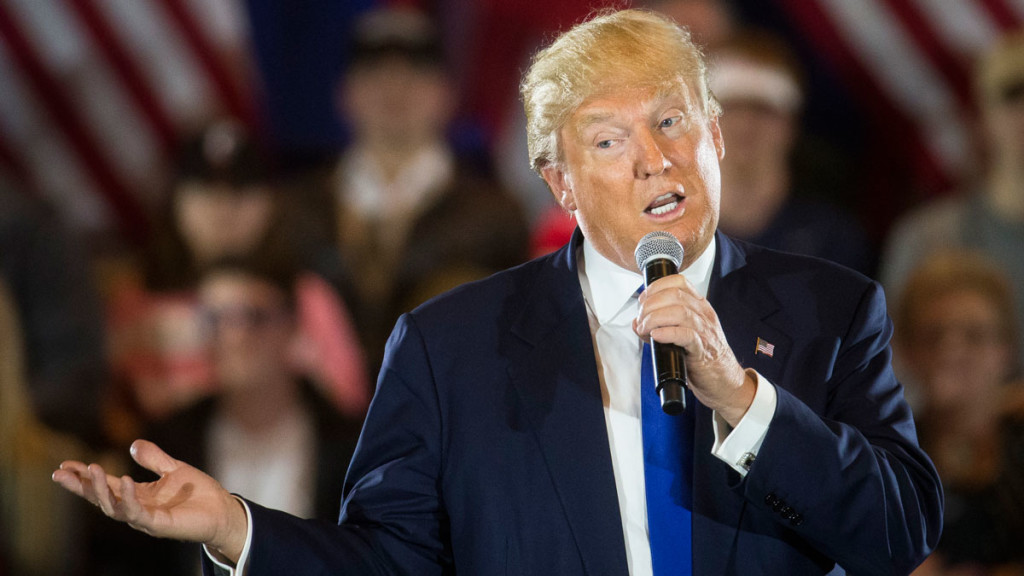
I forced myself the other night to watch in totality Donald Trump speak at two rallies in Ohio before that state’s primary — and initially I had great reservations about voting for him. At these rallies Trump rarely spoke more than five or six words in a sentence. When he was not repeating his canned slogans against Mexicans and the Chinese, he embraced an exaggerated confrontation with demonstrators, urging his security forces to “get ‘em outta here.” You would expect more from a 69-year-old billionaire with his background and intelligence. Up to now, Trump has been the “wise guy” candidate who spits out wisecracks and who masterfully plays on the frustrations of the average American. This “Trumpist” strategy has worked well so far. A political phenomenon, he has so far badly beaten a crowded GOP field of candidates. Trump has separated himself as the “anti-politician” in the race through callous rhetoric and manipulating the media. His arrogance was not countered effectively by the younger candidates such as Marco Rubio, Ted Cruz, or Chris Christie. There was no older wise man or woman in the GOP contest. Instead, most showed a remarkable lack of maturity and depth. All of Trump’s opponents, except maybe John Kasich, failed to understand what ails America. Trump, on the other hand, continues to say what most Americans think, but don’t say because they fear it might be politically incorrect. It’s a brilliant gimmick that is working well. Growing old makes most people a bit wiser. Reflection and learning are the key to gaining wisdom. At the time the Constitution was written, our forefathers made sure to impose what was at the time a high age requirement on elected federal officials. Article II, Section 1, Clause 5 of the U.S. Constitution provides: “No Person except a natural born Citizen, or a Citizen of the United States, at the time of the Adoption of this Constitution, shall be eligible to the Office of President; neither shall any Person be eligible to that Office who shall not have attained to the Age of thirty-five Years, and been fourteen Years a Resident within the United States.” The average life expectancy during that time was close to the age required to be president, so obviously the framers wanted American presidents to be reflective, wise old men. Indeed, many of our founding fathers were truly wise in their writings and their actions. In the 21st century, the presidency of the young and charismatic Barack Obama proved the opposite — he was a decade or more too early to be a great president. I regret that Trump and his shallow, reality television approach toward politics (that I would define as “Trumpistic,”) so far is chiefly characterized by a lack of innate wisdom. It’s made me have grave reservations about his candidacy. But there’s something inside me that says that Trump will prove himself — that he will be an evolutionary politician that will lead America into an era of prosperity and democratic leadership in the world. Despite his rhetoric, Trump is a great man already. He has achieved remarkable accomplishments as a developer and entertainer. He has experienced great personal and business failure too, which in my book is more important. That’s because old men often learn from their mistakes. So at the wise old age of 58, I can forgive Trump for all his nasty crap and vile gimmicks displayed in his campaign. It’s a shtick, that’s all. Deep down, I think Trump is the anti-Obama who will prove once he steps into the Oval Office that he has the same attributes that the founding fathers had. It’s that instinctual thought of mine, which is (secretly) shared by many angry Americans like myself, that will cause me and many others to vote for Trump. We’re not interested in a worn-out Hillary Clinton, despite Trump’s nasty theatrics on the campaign trail. *** Steven Kurlander blogs at Kurly’s Kommentary (stevenkurlander.com) and writes for Context Florida and The Huffington Post and can be found on Twitter @Kurlykomments. He lives in Monticello, New York.
54 percent of voters say they won’t vote for Donald Trump
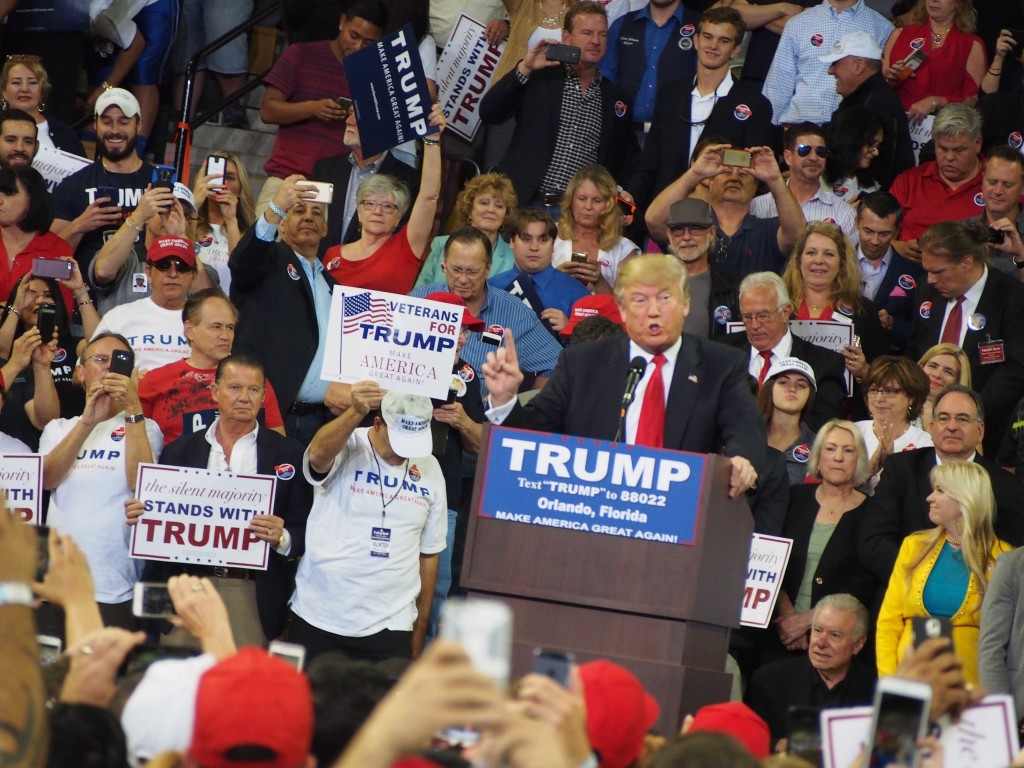
Donald Trump may be the leading in the polls, but more than 50 percent of voters said they wouldn’t vote for him in November. According to a Quinnipiac University Poll, 54 percent of registered voters surveyed said they wouldn’t vote for the New York Republican in the general election. Forty-three percent of respondents stated that they wouldn’t support Democratic front-runner Hillary Clinton. But voters might not have any other options. The survey found that Trump leads the GOP field with 43 percent, followed by Ted Cruz at 29 percent. John Kasich is in third with 16 percent. Trump leads the field among every cross section of respondents, except those who self-identify as very conservative. Among those Republican and Republican-leaning voters, 47 percent said they supported Cruz. On the Democratic side, Clinton leads Bernie Sanders 50 percent to 38 percent. Sanders, the poll found, does better among people between 18 and 44 years old and those who self-identify as very liberal. “Donald Trump and Hillary Clinton may have the overall leads among primary voters, but there is not a love in the room as a big percentage of Americans say of the front runners they could take ‘em or leave ‘em,” said Tim Malloy, assistant director of the Quinnipiac University Poll, in a statement Wednesday. The Quinnipiac University Poll was conducted from March 16 through March 21. The survey polled 1,451 registered voters and had an overall margin of error of 2.6 percent. The survey includes 652 Republicans with a margin of error of 3.8 percent; and 635 Democrats with a margin of error of 3.9 percent.
Presidential TV ad roundup: 3/18/16 edition

As Donald Trump inches closer to securing the Republican presidential nomination, advertising money aimed at sidelining him has skyrocketed 900 percent since his first primary victory in New Hampshire — totaling more than $63 million — according to an ABC News analysis of CMAG/Kantar Media data. Nevertheless Trump remains largely unscathed, seemingly impervious to the onslaught of TV ads attacking him. And while campaign spending isn’t correlating to the same results it used to, it hasn’t stopped candidates, their Super PACs and third party groups from spending a mind-blowing $323 million spend in presidential TV ads thus far this election cycle. Here are the ads the candidates released this past week: Ted Cruz Title: Grant Published: March 17, 2016 Tone: Somber Title: Lee Published: March 17, 2016 Tone: Matter of fact Title: Born Free Published: March 4, 2016 Tone: Informative John Kasich Title: Rise Published: March 8, 2016 Tone: Friendly Title: Bringing America Back Published: March 11, 2016 Tone: Encouraging Donald Trump Title: John Kasich – All Talk No Action Politician Published: March 11, 2016 Tone: Condemnatory Hillary Clinton Title: Real life Published: March 10, 2016 Tone: Passionate Title:Mothers of the movement Published: March 11, 2016 Tone: Mournful


